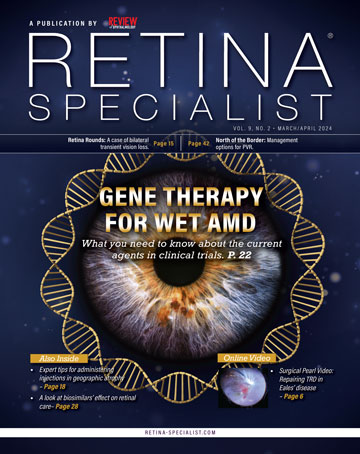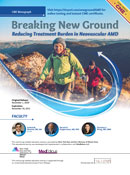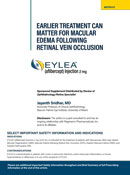Clinical Trials
Update: Gene therapy clinical trials in neovascular age-related macular degeneration
Companies are attacking the disease from multiple angles.
Hitting the century mark: 100 candidates and counting
Geographic atrophy continues to be the fastest-growing area of interest, and new entries double the number of dropouts.
A potential gene therapy to treat Stargardt
Phase II results identify patients with macular degeneration phenotype may benefit most from the investigative transgene therapy.
Transgene shows restorative properties in nAMD
4D-150 is an intravitreal dual transgene genetic medicine that expresses both aflibercept and an mRNAi sequence that inhibits intracellular expression of VEGF-C.
Potential of low-light therapy for dry AMD
Trial shows effectiveness of the Valeda Light Delivery System photobiomodulation platform.
Reviving dormant photoreceptors in LCA1
The gene therapy ATSN-101 has demonstrated safety and shown signals of efficacy in restoring vision in Leber congenital amaurosis.
A pill to head off worsening of DRSS
A Phase III trial is on deck for the oral Ref-1 inhibitor APX3330 after a Phase IIb study showed a potential benefit.
The potential impact of pegcetacoplan
Clinical implications of data from the OAKS and DERBY trials on the future treatment of geographic atrophy.
2023: The year of geographic atrophy
A comprehensive look at 87 clinical programs for investigative treatments in retina.
Two tales of DR progression
Clinical trials show encouraging outcomes for treating diabetic retinopathy progression, but the real-world evidence tells a different story.
Many new entries, but no impactful exits
The list grows longer with new entries and categories and no trials resulting in approvals.
Clinical trial lessons for managing diabetic retinopathy
Key clinical trials can help us determine how to individualize treatment plans for patients with diabetic retinopathy.
Retina Debate: Is navigated laser the answer for DME?
Its use to treat diabetic macular edema has increased, but not without controversy. These two experts debate its merits.
New revelations for nAMD, CSC treatments and ILM utility
Trial readouts on improving treatment durability, a potential new therapy for central serous chorioretinopathy and adding to the debate of RRD repair.
Can a Gene Vector Work for Long Term?
Lentiviral vector expresses protein for up to four years in trial.
Drugability of the Suprachoroidal Space
Phase II trial shows Clearside’s CLS-TA safe and effective in noninfectious uveitis.
Argus II in the Real World
Experience with six patients who have had this device implanted.
SPK-RPE65 Gene ‘Augmentation’
This biological agent targets mutations in genes that mediate visual transduction.



